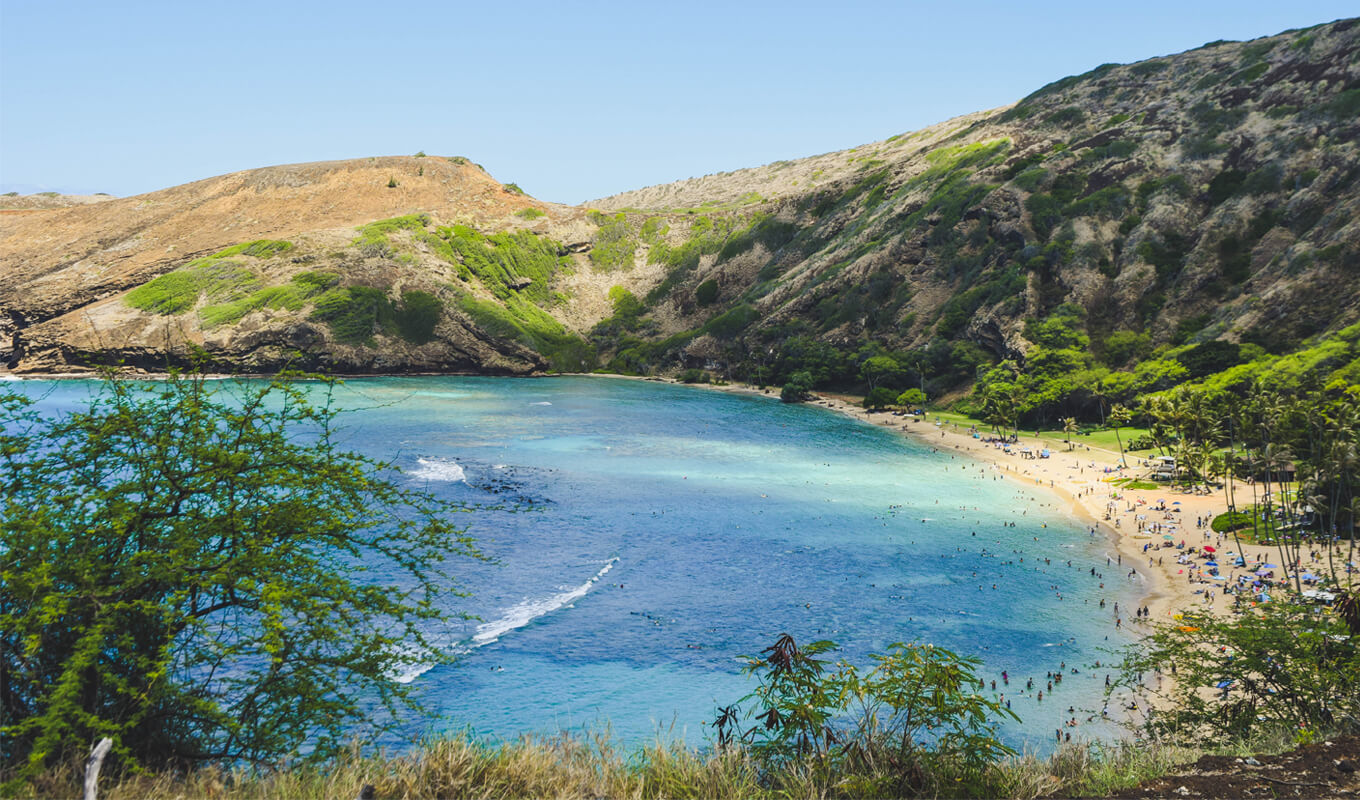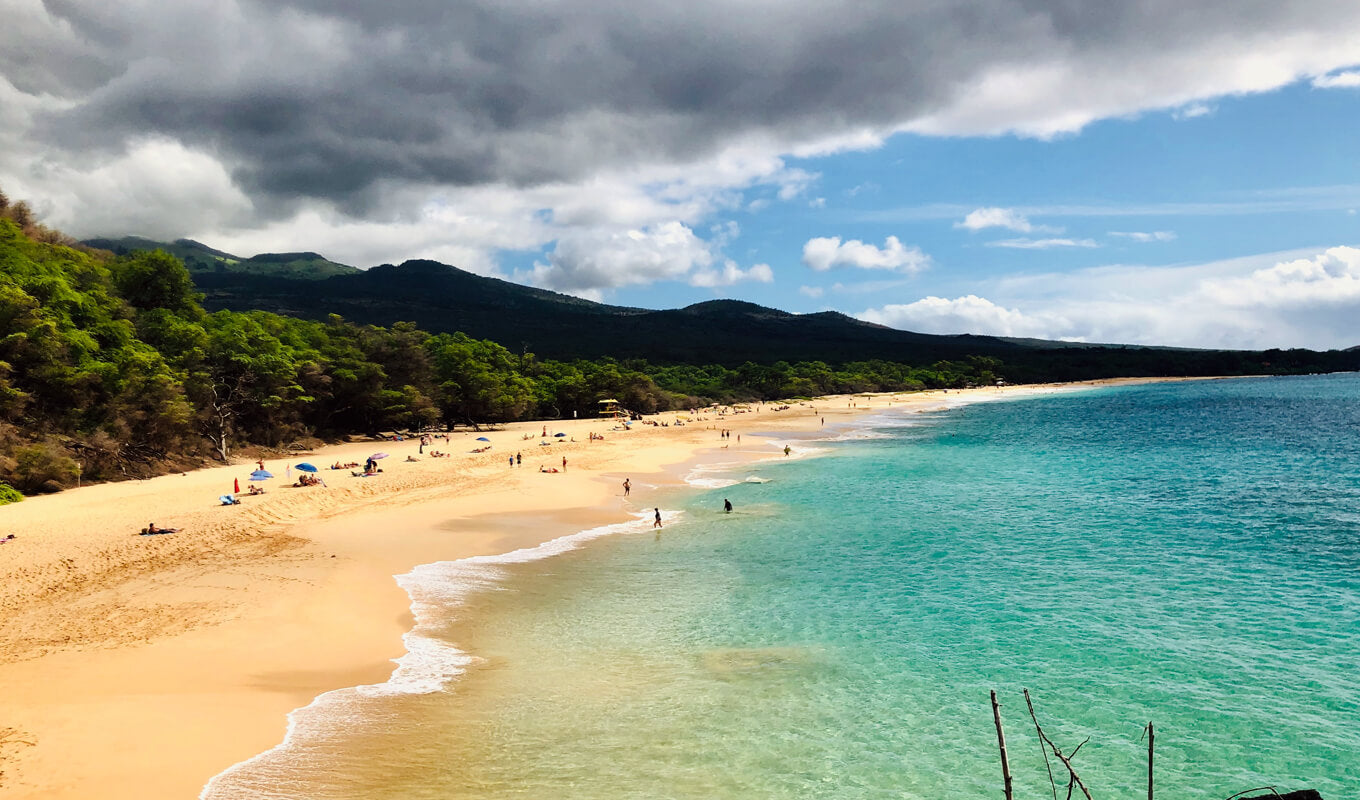Uw winkelwagen is leeg


Maui is the kind of place that paddle boarders dream of. Beautiful soft sand beaches, crystal clear oceans, and a huge variety of aquatic animals that can be seen from the comfort of your board.
If you’re lucky enough to be visiting and paddle boarding in Maui, we’ve come up with 8 of the top places to SUP that you really won’t want to miss. So, without further ado, let’s spill the beans on where to paddle board in Maui.
Table of Contents

Honolua Bay is on Maui’s northwest shore, and during wintertime, when the waves are big, it becomes a firm favorite amongst the local surfing community.
The calmer months at Honolua see an influx of snorkelers and scuba divers thanks to the Mokuleia Marine Line Conservation that has created an ideal habitat for a selection of marine life and tropical fish species. The water in Honolua Bay is so clear that you can even spot Hawaiian green sea turtles while standing on the deck of your board.
On the days when the water is particularly calm, you can even practice SUP yoga or different kinds of SUP fitness, all with a beautiful backdrop of palm trees, blue skies, and picturesque waters.
Some slight downfalls to Honolua are the fact that the narrow “beach” is extremely rocky, and the car park is slightly further away than other paddling locations on Maui. With that being said, if you have an inflatable paddle board, the journey would be no issue. For your convenience, there is also a boat ramp on the beach to help get your SUP in and out of the water.

Another incredible Maui stand up paddle boarding destination is Kaanapali Beach. The beach is home to Hawaii’s first-ever planned resort, a world-class shopping complex, and a renowned whaling museum.
Kaanapali Beach is well known on the island because of its daily cliff diving ceremony, which happens on the beach's northernmost cliffs. Every evening at sunset, a diver lights torches along the cliff and dives off the rock.
Visitors to the beach can also test their bravery by jumping off the rocks, or they can simply grab some snorkel gear and witness the beauty that lies beneath the water's edge.
The beach at Kaanapali is soft sand and a perfect launching spot for a paddle board. Whether you have an inflatable SUP or a hard board, you can set up your board and set off paddling into the crystal blue waters from the shoreline. Once you’re done paddling for the day, you can spend the afternoon rehydrating in one of the many beachside restaurants.

Kapalua Bay's calm, sheltered cove has beautiful blue waters and minimal waves, making it a superb paddling destination on Maui’s northwest shore. It’s actually said to be one of the calmest bodies of water on Maui.
As the bay is protected by two reefs that form the C-shaped cove, the snorkeling opportunities are endless, and many people flock to the bay because of it.
If you’re new to stand up paddling Kapalua Bay is a great practice location that has easy access to the water and shallower areas so you can gain your confidence on the board.
The beach has public restrooms and the parking area is just a short walk away from the sand. It’s important to note that this beach does get extremely busy during the high season so it's suggested to arrive early in the morning to ensure yourself a parking spot.
As Maui is a tropical island with relatively high temperatures all year round, it is important to always pack a water bottle for when you’re out on your SUP. Although beaches like Kapalua have cafes and restaurants close by, it’s always better to have your own supply of water to prevent dehydration, especially if you’re far out in the ocean paddling.

Kihei is located on the sunniest and driest end of Maui, the southwest shore. Previously the beach was a regular destination for the Hawaiian royalty because of its picturesque scenery and clear views of West Maui, Lanai, Molokini, and Kahoolawe.
Nowadays the beach area is a popular spot for swimming, surfing, snorkeling, kayaking, and paddle boarding. One of the best parts of Kihei is that during your paddle you may catch glimpses of giant humpback whales, which let’s be honest, is a sight you don’t see every day.
Just behind the shoreline is the Kihei’s Kalama Beach Park that features shaded lawns, stretches of palm trees, a roller-skating rink, a skate park, courts for a selection of sports, picnic pavilions, and even a baseball field.
Kihei is a fantastic SUPing option if you want to spend the entire day at the beach front as it has all the facilities you could possibly need for a day out at the seaside.
As with many other places on Maui, it’s a great idea to take some snorkel gear so you can appreciate the marine life underneath you.

Makena Beach State Park has some of the biggest and best beaches on Maui. With ⅔ of a mile of white sand that is undeveloped, you’ll truly be able to immerse yourself with nature. Thanks to the two black-lava outcroppings that surround Makena, the beach and nearby ocean are protected from winds and give visitors fantastic views of Molokini and Kahoolawe.
The areas at Makena are split into two beaches that are known as Big Beach and Little Beach. Little Beach is often used as a nudist beach, even though the state park prohibits nudity, so if you’re paddling with young children, it’s probably best to stick to the waters at Big Beach.

Slightly further up the coast from Makena beach is Maluaka Beach. This area of Maui is known as “Turtle Town” and I’m sure you can guess why. Maluaka is one of the best beaches to see Hawaiian sea turtles and other aquatic wildlife whether that be from under the water, or from your SUP.
Maluaka Beach is one of the quieter beaches around the area so it would make a good destination for those wanting a more relaxing paddle. Waves can occasionally get big at Maluaka which can give the more experienced paddlers a slightly more challenging adventure.
Parking is available close to the beach front at one of two car parks. The first is just past the Maui Prince Hotel, and the second is near the Keawala’i Church.

Napili Bay has white sand beaches that gently slope into the ocean’s turquoise water. As the waters at Napili are usually calmer than other areas of Maui, it is a popular swimming, paddle boarding, and sunbathing destination.
The bay has distinctive reefs that are regularly frequented by sea turtles, and the abundance of coral is also home to many fish species making it yet another great snorkel location. During the winter months when whales migrate to the warm waters of Maui, you can often see them swimming about in the water.
As mentioned before, the waters are calm in Napili Bay, but occasionally when large swells form, the waves in the bay can be relatively big so it’s best to avoid the waters during these times. Unless you’re an avid SUP surfer that is.
After you’ve finished paddling, you can grab a bite to eat at the Sea House restaurant that has excellent views of the water and the shoreline.

The final Maui SUP destination on our list is the Maliko Run that should only be tackled by experienced paddlers. The Maliko Run is a downwinder run that starts at the north of Paia and flows down to the Kanaha Beach Park.
Warm water and consistent winds make the Maliko Run the holy grail of downwind paddling. To hit the wind you may have to paddle out relatively far, but once you reach the exact spot, you’ll be paddling on some of the best downwind conditions imaginable.
Many people have said that during their time on the Maliko Run they’ve seen animals such as sea turtles and even flying fish.
Because of the fast-paced conditions of the Maliko Run, it is highly advised to always wear a PFD, a paddle board leash, and a paddle leash so your board and paddle don’t float away from you if you happen to fall in.
If you aren’t taking your own board on your Maui vacation then there are a few places around the island that you can rent one from. If you’re new to paddle boarding, some of these rental companies also offer lessons and guided tours of the islands waterways.
Paddle boarding is extremely safe in Maui as the waters are relatively calm. As with other places, it is advised to wear a PFD to keep you safe in the event of an emergency, and to paddle with caution.
If the waves are too big or if there are reported swells, it’s probably best to leave the paddling to another day.
Paddle boarding to Molokini isn’t advised as the waters can be choppy and it is too great of a distance to paddle without the aid of a motor. On a boat with a motor, the ride from Maui to Molokini is roughly an hour, so I'm sure you can imagine how long it would take on a SUP.
With that being said, you can paddle board at Molokini after hitching a ride on one of the boats that departs from the Maalaea Harbor.
Maui has many incredible places to paddle board which you think is best will solely come down to your personal preferences.
Yes! You can take your own paddle board to Hawaii as checked in luggage on your flight. Inflatable paddle boards are your best option when traveling with a SUP because they can be deflated and stored in a medium sized backpack.
The backpack can then be checked in with your other bags and won’t be seconded to the extreme fees airlines place on oversized luggage such as surfboards and hard top boards.
Inflatables are also more convenient when catching a taxi or bus to your hotel or accommodation on the island as they can fit in the boot or backseat of any vehicle.
Reacties worden goedgekeurd voordat ze verschijnen.